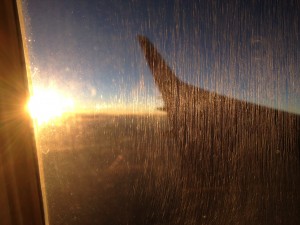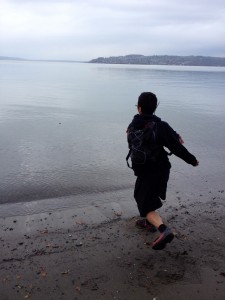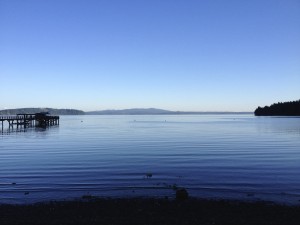Three or four times a day, a plane will fly over the University of Puget Sound. Professors will pause mid-sentence as they teach, waiting for the noise to fade, while students walking below will take out their earphones and search the sky. Sometimes they will see the plane, low over the campus; other times the clouds will hide the jet from sight. But no matter the type of plane or the time of the day, one thing never changes—the silence that follows.
I leave the library, head back to my dorm. It’s overcast, but the sunlight still peeks around the edges of the clouds. I think about what homework I have left to do. No, don’t think of that. I think that I haven’t posted on the blog in a while. Two weeks? That’s a while. I think, What can I write about?
Today the Finnegans Wake reading group recommences—that is, after a break for winter vacation. I remember just as I enter my dorm. It meets in ten minutes. So I say bye to my room and head back out. I’m convinced that Joyce is someone I will never understand. Reading his work is like trying to get to the center of a giant lollipop, lick by lick. And when you get there, you find a giant cricket; you prod it with your tongue to see if there’s something more, and then you vomit. Or else you’re just not getting it. We get through about a page each time we meet.
Then that’s over and I think I can go back to my room. But I remember that I have to meet with a group for a project that cannot wait, and that I’m late. I sigh, or groan, or do both at once, and fast-walk to the library, because what is life if you’re not tracing and retracing your steps? Out of the library, into the library. I take the steps by two and find the room they’ve set up in. I forgot my laptop.
But this isn’t a record of a twenty-year-old’s angst.
A plane crashes in Taipei.
I’m outside in the drizzle, talking to a friend I haven’t talked to in a while. He’s telling me about the snow on the East Coast, how cold it is right now. A plane flies low overhead; I am deafened to my friend. I raise my voice to speak, but I’m not getting through. I wait it out, try to walk in the opposite direction.
The plane passes and everything is silent. I sigh and tell him I’ll talk to him soon, I have to go now. A lamplight turns on above me. The sun sets behind a mountain; it has just risen in Taipei.
Back at my dorm, a suitemate of mine is eating a lollipop. He sucks it for a while, then bites, cracking it in two. He throws the stem in the garbage can. Want to go to the library tonight? he asks.
Maybe I’m just not getting it.



